
DPC Newsletter
Student Conferences Spotlight
Volume 7, Issue 3

Consortium News
SF BUILD Scholars participate in 'Reclaiming Nature' project
By Anel Lizcano and Genievive del Mundo
After two years of online teaching due to the COVID-19 pandemic, the SF BUILD program finally returned to in-person training in the Summer of 2022. The team excitedly welcomed the cohort 8 trainees to the SF BUILD Scholar Program Summer Rotation. This year, the summer program included a new element based on San Francisco State University’s Reclaiming Nature project, a transformative community-centered intervention.
The 6-week long rotation began with three weeks at San Francisco State University (SFSU) in July and ended with three weeks in August at the University of California, San Francisco (UCSF). At both locations, the Scholars received one-on-one mentoring, career development and ethics training, hands-on wet lab experience and a glimpse of both biomedical and community-engaged research. These activities contribute to the broader SF BUILD program aims of enhancing academic performance, creating strong and supportive communities, enhancing wellbeing and mental health, and creating a strong science identity for the Scholars.
This year, SF BUILD added a component to the rotation centered on the Reclaiming Nature project that included reducing stress and anxiety, and shining light on the benefits of mindfulness, mediation, physical activities and community engagement with nature.
What is the 'Reclaiming Nature' project?
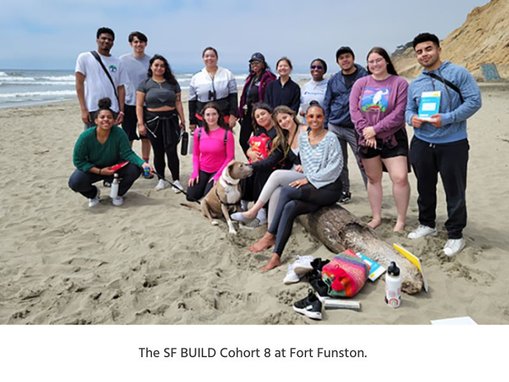
The Reclaiming Nature project is funded by a U01 grant from the National Institute of Minority Health and Health Disparities (NIMHD), part of the National Institutes of Health. The overall goal of the Reclaiming Nature project is to reduce growing health disparities in Black, Indigenous and People of Color (BIPOC) communities through the examination of culturally appropriate interventions. This intervention consisted of providing equitable access to physical activity in nature.
The idea came about with the success of the Promoting Activity and Stress Reduction in the Outdoors (PASITO) project, which aimed to reduce chronic and infectious diseases in the Latinx community living in Richmond, California, by implementing an intervention that would alleviate chronic stress through exercise. After agreeing to participate in the study, participants engaged in organized walks and physical exercise in East Bay Regional Parks as a way of reclaiming nature. The project additionally collected biospecimens of hair and saliva to measure biological levels of stress, and participants completed surveys to monitor behavioral outcomes as self-reported measures of stress and psychological affect. The PASITO project demonstrated successful recruitment, retention and biospecimen collection of a population that has been labeled as “hard to reach.”
One reason the project may have seen positive outcomes could be the connection between the researchers and the community. After completing phase I of the PASITO project, the researchers conducted interviews during which respondents highlighted the “strong effects of insider researchers, a sense of community and belonging, accessible programming, and health- promoting activities” (Johnson, et al., 2021). They proposed “that the first three themes emerged due to the inclusion of insider researchers who are authentically committed to giving back to the communities they come from, and to improving the health of marginalized communities in general, through use of their community cultural capital.”
The SF BUILD scholars got the opportunity to design their own “Healing in Nature” intervention as a way to put into practice what they learned during the summer rotation. With the guidance of the SF BUILD leadership team, students wrote several scientific proposals that aimed to reduce health disparities in communities of color. Topics included adding music as an intervention during nature walks, diversifying the types of physical activities to be more inclusive and developing incentive programs to provide transportation and housing for cancer clinical trial participants who travel long distances for treatment.
To learn more about transformative research projects at San Francisco State University and the Cal State Universities, listen to SFSU president Lynn Mahoney, PhD,’s presentation at the CSU Board of Trustees meeting on Sept. 13. Among other projects, Mahoney discusses the Reclaiming Nature project that is intended to address health disparities and advance health equity.
Kicking off 'Wellness Wednesdays'
In addition to working hard during the summer rotation, the SF BUILD scholars also played hard to attain mindfulness and reduce stress. The scholars had “Wellness Wednesdays” during their rotations at SF State.
The first week’s activity was a nature hike at Fort Funston, a national recreation area in San Francisco. The scholars journaled and some practiced walking meditations, all the while bonding with each other. Some had never been to Fort Funston and had recently moved to the Bay Area.
Scholars said they enjoyed, “taking the time to sit back, feel the fresh air and take in the beautiful ocean views. Today was awesome!”
“It was nice being out in nature with the group; it was a chance for us to get to bond and get close.”
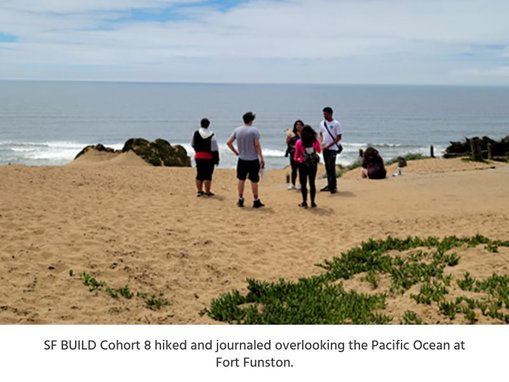
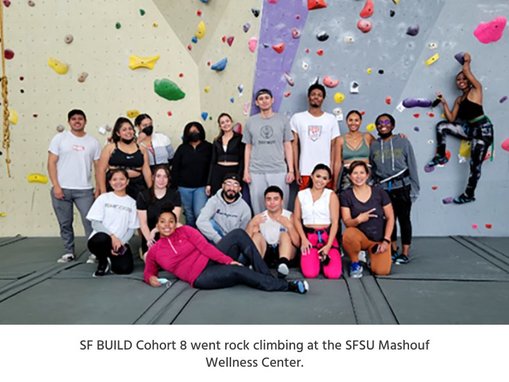
Healthy Movement
During week two, the scholars got to experience being on the top of the world—or at least the top of the wall—while participating in a rock climbing trip to the Mashouf Wellness Center.
This activity encouraged healthy movement and being present as they reached from one boulder to the next.
“I loved the interaction with nature and rock climbing tested me. I think it genuinely challenged everyone to be better,” one of the participants said.
“It was my first time being in the wellness center, as well as my first time rock climbing. I had lots of fun because everyone was very encouraging.”
Immersive Wellness Experience
Finally, during the third week, the scholars participated in a sound healing session at Lake Merced.
The immersive wellness experience included sound healing with crystal singing bowls, guided meditations and nature sounds. Scholars snuggled in their blankets, coats and yoga mats while immersing themselves in the sound healing meditations.
All in all, participants expressed that it was a great start for the SF BUILD cohort 8 rotation during the summer. Many voiced that they want to implement “Wellness Wednesdays” into their routines moving forward. The group was able to bond strongly.
“This program really helped me adapt, and as a newcomer to the Bay and having moved here all alone, to experience a sense of belonging and family.”
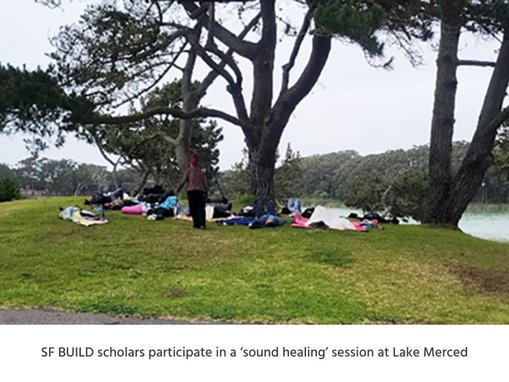
UAF BLaST Scholars attend 2022 Sitka Whalefest
By Amy Topkok
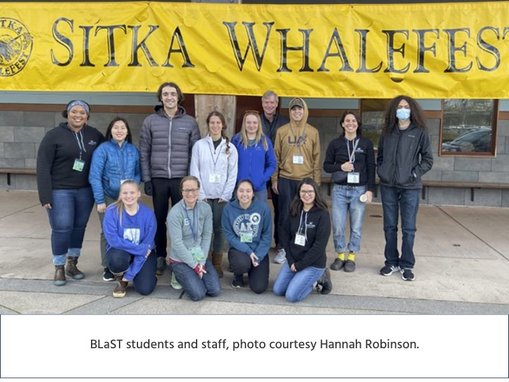
The Biomedical Learning and Student Training (BLaST) program at the University of Alaska Fairbanks (UAF) has been collaborating with Sitka Whalefest for years.
This year, 10 BLaST students and Research, Advising and Mentoring Professional (RAMP) Hannah Robinson attended Whalefest from Nov. 3 to 6.
The Sitka Whalefest is an annual statewide event that incorporates the whole community and many organizations.
Marine scientists from UAF and Southeast campuses, Sitka Sound Science Center, Sitka Tribe of Alaska and many others from in and out of Alaska presented research findings, current events and issues related to this year’s theme of “How it is Made: Courting, Babies and Growth.”
Whalefest was open to high school students, college undergraduates, graduate students and community members from the region and all over Alaska.
Students who attend can often earn college credits and also participate in discussions with speakers, allowing them to be engaged in research areas that help introduce them to marine biology, ocean science and many other related topics.
Attendees also had the opportunity to participate in the local quiz competition “Ocean Bowl,” as well as a Whalefest Fun Run 5K, a 10K race, a 2-mile walk and an evening marine-themed “Maritime Grind” filled with local band performances.
The BLaST Scholars who participated were Tirzah Bryant, Sarah Dempsey, Orlin Gologergen, Rhayne Loggins, Michael Martins, Michelle Ramirez, Kristen Reece, Sable Scotton, Kaia Victorino and Lucy White.
Reece said one of the things she learned while attending the Sitka Whalefest was that the marine science reproductive world is more complicated than she thought.
“The presenters were knowledgeable, and I appreciate how they engaged the community in discussions on their research,” Reece said. “I really enjoyed attending the symposium with my peers and discussing what we learned, and also the opportunity to explore the town of Sitka and engage in scientific activities with fellow researchers.”
BLaST believes in giving those from diverse and disadvantaged backgrounds opportunities to attend events like these in-person, so they may benefit from seeing people in biomedical fields truly putting their knowledge and experience into action.
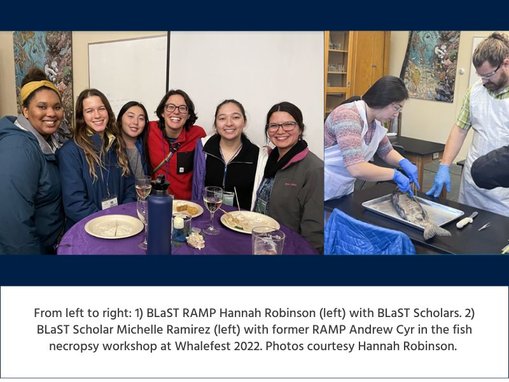
The Coordination and Evaluation Center at UCLA is supported under award number U54GM119024.

Grow Together.